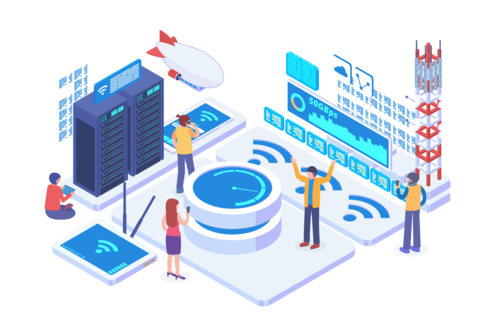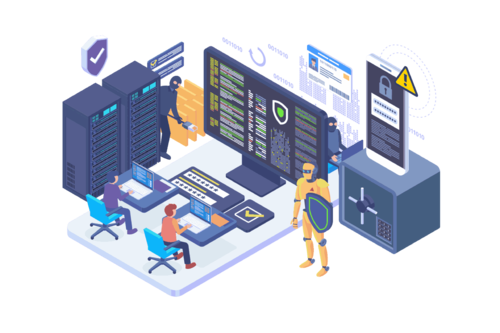Global Logistic
Solutions for international companies
Global IT concepts also offer enormous savings potential
As a globally active company, we offer our customers a fast and reliable logistics solution. Whether national or international, we ensure your products are delivered on time and efficiently. Our team of experienced logistics experts ensures that deliveries arrive on time and reliably so that customers can get their networks and security infrastructures up and running as quickly as possible.

Global Logistic
Companies with international locations need to think globally when planning and implementing. A variety of factors play a role in the choice of location. Cross-location applications should be seen as an advantage rather than a disadvantage.
In many cases, the IT infrastructure remains a local matter and is limited to the definition of uniform standards. There is also the other extreme: global procurement measures that do not take local conditions into account.
Wo liegen im Bereich der mobilen Infrastruktur potenzielle Probleme, wo lassen sich hohe Einsparpotentiale nutzen?
Global IT benefits
We do not want to analyze the advantages or disadvantages of end-to-end processes and programs here - we leave that to the system specialists - but only the possibilities of an end-to-end hardware structure.
The first factor is the reduction in the use of materials. Hardware components are usually planned per location. If the application and therefore also the required central components are deemed to be process-critical, they are backed up by a redundant design or via service level agreements with extremely short response and recovery times, which are correspondingly cost-intensive.
A cross-location overall concept offers an alternative here.
By selecting and connecting appropriate products, solutions can be created in which the local devices only need to be procured once, as a fully automatic failover to a central instance takes place in the event of a fault. With these 1:N redundancies, not only can up to 40 % of the acquisition costs be saved, but a further 30 % through reduced maintenance and service costs.
As a result, end-to-end management solutions can also be implemented in which local deployment requirements can be significantly reduced in terms of quality and quantity.
In various projects, we have also implemented a "self-healing" overall concept in which free capacities, e.g. due to different working hours, automatically bridge faulty system parts. Replacing defective components is then only a question of logistics. The new devices are commissioned by the system itself. IT management no longer has to configure anything, but simply checks that everything is working properly.
This also largely compensates for the higher service requirements in other countries due to poorer infrastructure, lower availability, etc.
Another advantage of end-to-end solutions is the more flexible support for mobile employees. As a kind of by-product, standardized security implementations can be carried out that enable consistently secure and uniform authentication of users, even when moving between locations. Local settings such as language can be assigned to the user profile and easily adopted locally. You feel at home wherever you are.
Info Detail
Since its foundation, aeroaccess GmbH has been an internationally oriented and customer-focused company.
Problems with the international use of HF technology
However, when using mobile technologies across national borders, a number of special features must be taken into account. First of all, different legal requirements have to be taken into account in many countries, i.e. licensing requirements for the use of RF technology. This has various aspects:
- Certification according to various standards
- Restrictions on the transmission frequency or channel selection
- Limitations on maximum transmission power
- Restrictions on the combination of systems (free choice of antennas)
- Non-selective indoor and outdoor use
- Zusätzliche länderspezifische Beschränkungen
While some of these requirements are covered by the hardware and firmware or by different country versions of the manufacturers, other areas can only be validated via the product selection, the design or even the procurement channel.
For example, anyone who believes that a US product is preferable to a German product is mistaken. In the USA and Israel, for example, it is illegal for the user to specify the national settings. This means that the US version of a product cannot be operated in most other countries. German approval, on the other hand, transfers responsibility to the user.
If you then want to implement cross-border concepts, the system integrator must not only select the right products, but also have detailed knowledge of system behavior - even in the event of a fault.
However, there are also countries where operation is completely prohibited or where the costs are disproportionate to the benefits.
Import and export of HF products
Another hurdle is the export or import of products to the individual countries. Local procurement is rarely the best solution. On the one hand, specialists are then needed for each country, who all have to be kept at the same level of knowledge, and on the other hand, only unconfigured devices can be used, which rules out a physical comparison.
In order to overcome this hurdle, in addition to the usual issues such as customs, taxes, transportation and insurance, the HF cliffs must also be avoided. In the simplest case, this can be solved with manufacturer certificates, but in some cases these have to be translated into the local language. In extreme cases, these must be obtained from the relevant local institutes or authorities. In some cases, local partners with the relevant import licenses are also required.
List of countries
Although there are different approvals that need to be met even within the EU, these are relatively easy to implement. However, if you are planning to implement an HF system in one of the following countries, you should definitely carry out thorough research beforehand or speak to us.
Afghanistan, Albania, Algeria, Angola, Argentina, Armenia, Bangladesh, Belize, Belarus, Benin, Bolivia, Bosnia and Herzegovina, Brazil, Burkina Faso, Burundi, Cambodia, Cameroon, Central African Republic, Chad, China, Colombia, Comoros, Congo Democratic Republic, Congo Republic, Costa Rica, Cote d’Ivoire, Croatia, Cuba,
Djibouti, Dominican Republic, Ecuador, Egypt, Equatorial Guinea, Eritrea, Ethiopia, Gabon, Gambia, Georgia, Ghana, Grenada, Guinea, Guinea-Bissau, Guyana, Haiti, India, Indonesia, Israel, Iran, Iraq, Jamaica, Kazakhstan, Kenya, Kiribati, North Korea, South Korea, Kuwait, Kyrgyzstan, Laos, Latvia, Lebanon, Lesotho, Liberia, Libya, Lithuania, Macedonia, Madagascar, Malawi, Malaysia, Maldives, Mali, Mauritania, Mexico, Moldova, Mongolia, Montenegro, Morocco, Mozambique, Myanmar, Nepal, Nicaragua,
Niger, Nigeria, Pakistan, Palestinian Authority, Panama, Papua New Guinea, Paraguay, Philippines, Russland, Rwanda, Sao Tome and Principel, Saudi Arabia, Senegal, Serbia, Seychelles, Sierra Leone, Solomon Islands, Somalia, Sri Lanka, Sudan, Suriname, Swaziland, Syria, Tajikistan, Tanzania, Thailand, Timor-Leste, Togo, Tonga, Trinidad and Tobago, Turkmenistan, Turkey, Uganda, Ukraine, USA, Uzbekistan, Vanautu, Venezuela, Vietnam, Yemen, Zambia, Zimbabwe
Other services
Get in touch with us
We look forward to hearing from you. Here you have the opportunity to send us your questions, suggestions or inquiries. Our team will deal with your concerns as quickly as possible.
You can also contact us at the telephone number provided or by e-mail. We always strive to provide you with excellent service and will be happy to assist you.
Thank you for your interest in our company. We look forward to hearing from you.


